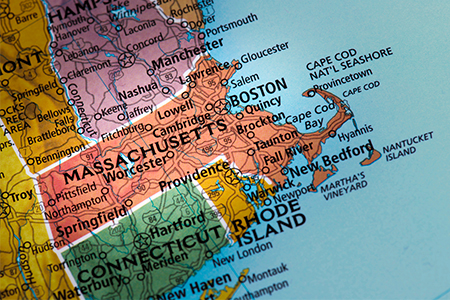You May Also Like
- Accounting Master’s Programs
- Bachelor’s in Accounting
- Accounting Programs
- Vermont CPA Exam & License Requirements 2024
- Rhode Island CPA Exam & License Requirements 2024
- New York CPA Exam & License Requirements 2024
- New Hampshire CPA Exam & License Requirements 2024
- Connecticut CPA Exam & License Requirements 2024
MASSACHUSETTS CPA EXAM & LICENSE REQUIREMENTS 2024
Though there are a myriad of certifications that accountants can aspire to, none can surpass the CPA license.

As the economy continues to grow, so does the need for accountants. Businesses and individuals need accountants to do the taxes, balance the books and help plan for a healthy financial future. Accountants also help with corporate finance functions such as institutional investing, mergers and acquisitions. Though there are a myriad of certifications and credentials that accountants can aspire to, none can surpass the Certified Public Accountant (CPA) license. Each state has its own criteria for licensure, renewal and reciprocity, but every one holds the CPAs in the highest regard. Keep reading to learn how to become a CPA in Massachusetts.
Massachusetts’ standards for CPA licensure are much like those of many other states. They require that all licensees be at least 18, have a bachelor’s degree and hold a Social Security number. However, they do not require that they be state residents nor that they be U.S. citizens. To sit for the CPA exam, candidates much have a baccalaureate degree that includes a minimum of 120 semester hours. To become licensed, 150 credit hours are required. During your tenure as a student you will also need to take certain courses to satisfy the Massachusetts Board of Accountancy. CPAs must also complete experience requirements.
Academic Standards
To satisfy the Board and sit for the CPA exam, you will need to complete 120 semester hours of undergraduate coursework from a regionally accredited university. Those hours need to meet certain requirements for coursework. Discuss these requirements with your college or university advisor to make sure that you plan your courses accordingly. One notable exception is that if your school is accredited by the AACSB—The International Association for Management Education—you will not need to worry about fulfilling the specific requirements laid out below. Those requirements areas follows:
21 Credits in Accounting Including:
- Financial Accounting
- Auditing
- Cost Accounting
- Taxation
AND
Nine General Business Credits Including:
- Accounting Information Systems
- Business Law
- Finance
If you are attending a Massachusetts institution, your advisor will likely be aware of the board’s requirements and will have a well-established plan for you to follow. Colleges want to see their students and graduates succeed, so they will be there to support you.
To complete the remaining 30 credit hours and achieve your CPA license, you might work on the following:
18 Graduate Credits in Accounting Including:
- Financial Accounting
- Auditing
- Taxation
- Management Accounting
You can complete the final education requirements with undergraduate coursework, but your resume will look all the better if you can show graduate-level work. If those 18 hours are not enough for a degree, perhaps you can find an accredited institution that will give a certificate in accounting, perhaps as part of a larger Masters of Business Administration (MBA) program.
Once you are ready to submit work for either the CPA exam or full license, you must be sure that your official transcripts are sent. Note that you will need transcripts from every institution you have attended, not just your alma mater.
CPA Examination
The CPA exam is one of the most difficult of all the professional exams, including the Bar Exam. It is comprised of four sections that can be taken in rapid succession or drawn out over as much as 18 months. In fact, as many as half of all applicants do not pass one or more parts of the test on the first try.
The four sections of the exam are:
- Financial Accounting and Reporting (FAR)–This section covers financial reporting frameworks from several industry experts. Candidates are asked to compare statements that reflect different reporting standards.
- Auditing and Attestation (AUD)–This part tests your knowledge of the International Standards of Auditing as well as U.S. standards.
- Regulation (REG)–Your ethical, professional and legal responsibilities are covered in this test.
- Business Environment and Concepts (BEC)–This portion covers general business concepts and international business. Written communication skills are vital to complete much of the test.
Once you have passed all four parts of the CPA exam, you are then ready to begin the experience portion of the licensure process. Massachusetts requires that certain duties be performed during your experience. You will need to have a superior sign off to confirm that you demonstrated competency in the following areas:
- Attestation
- Report on full disclosure statements
- Full disclosure compilations
Your supervisor must provide a letter to the board that completes your application. It needs to verify your dates of employment, as well as affirming that he or she is a licensed Massachusetts CPA and is a shareholder or partner at the firm where you worked.
You can opt out of the experience requirement if you achieved a master’s degree.
Massachusetts is a great place to practice accountancy. Boston has one of the nation’s premier financial markets and the greater suburban area is bursting with commercial energy. To learn more about becoming a CPA in Massachusetts, visit the Board’s website: Massachusetts Board of Public Accountancy.